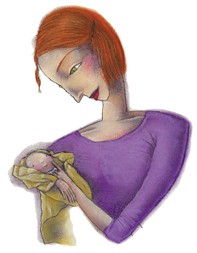Peer Reviewed
Feature Article Women’s health
Early parent–infant attachment: what can the GP do to help?
Abstract
GPs are ideally placed to observe the development of parent–infant relationships during the first three years of an infant’s life, and to be alert to potential problems in these relationships. Emotional support and developmental guidance are appropriate primary care interventions for attachment difficulties and are likely to significantly benefit the parent–infant pair.
Key Points
- Normal parent–infant attachment is necessary for emotional and intellectual development during childhood and, indeed, into adult life.
- Insecure infants are more likely to have behavioural and learning difficulties by the time they commence school; they are also at risk of having greater difficulties in interpersonal relationships throughout their lives.
- A mother’s own observation that she doesn’t feel close and loving enough with a particular baby is sufficient ‘evidence’ to alert the GP to ask further questions and perhaps to act.
- Supportive interventions, providing some new information and involving the partners, can often provide quite rapid relief for struggling parents.
Purchase the PDF version of this article
Already a subscriber? Login here.

